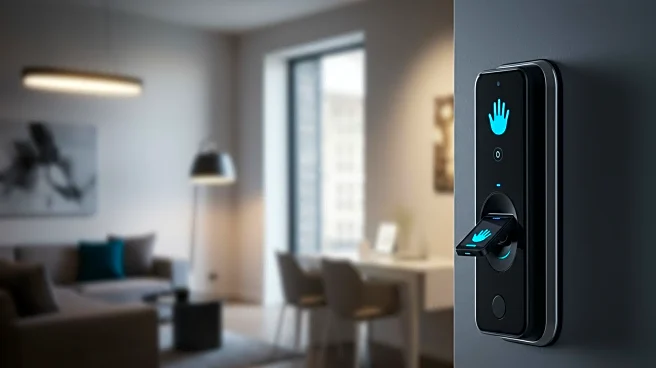What's Happening?
TCL has launched the D2 Pro, a smart lock that utilizes palm vein scanning technology for secure access. The device uses near-infrared light to read the unique pattern of blood vessels in a user's hand, offering a high level of security. The D2 Pro claims a 99.9999% accuracy rate and features 'liveness detection' to ensure it only works with living hands. This biometric data is stored on the device, allowing it to function without an internet connection. The smart lock can be unlocked in six different ways, including palm scanning, a number pad, a physical key, app control, Google Home, and Amazon Alexa. Despite its innovative technology, the D2 Pro faces challenges with buggy firmware and limited smart home platform support.
Why It's Important?
The introduction of palm vein scanning technology in smart locks represents a significant advancement in home security. This method is considered more secure than fingerprint sensors, as it relies on internal blood vessel patterns. The D2 Pro's ability to function offline enhances its reliability, making it a valuable option for users concerned about privacy and internet dependency. However, the lack of support for Apple Home and the Matter standard limits its integration with broader smart home ecosystems. This could impact consumer adoption, especially for those invested in comprehensive smart home setups.
What's Next?
TCL plans to address some of the D2 Pro's limitations by introducing an Apple Home-specific version and potentially expanding support for the Matter standard. This would enhance compatibility with various smart home platforms, making the device more appealing to a wider audience. Additionally, TCL aims to improve the app's functionality, including local control during internet outages, which could increase user satisfaction and trust in the product.
Beyond the Headlines
The D2 Pro's reliance on palm vein scanning raises questions about the future of biometric security in consumer devices. As technology advances, ethical considerations regarding privacy and data security become increasingly important. The device's ability to store biometric data locally is a positive step, but ongoing developments in smart home integration and data protection will be crucial in shaping consumer trust and industry standards.









